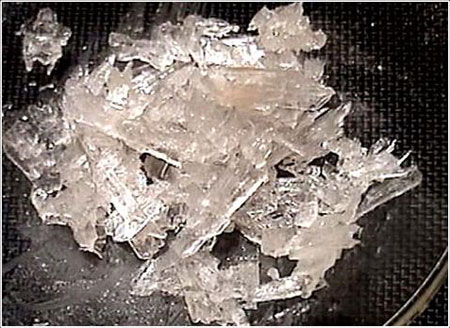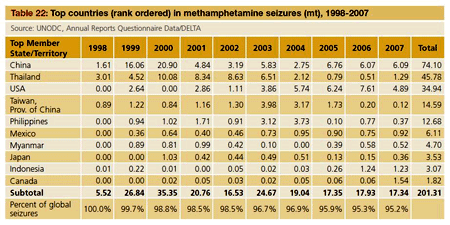The three-story house in Pasig City was called "Malacañang," a notorious shabu den, its moniker perhaps a symbol of the drug’s status in the criminal world. Even though the house’s alleged owner has been in the custody of the National Bureau of Investigation (NBI) for over two years, this Malacañang continued to operate. When the Philippine Drug Enforcement Agency (PDEA) finally raided the drug “palace," around P2.5 million worth of suspected methamphetamine hydrochloride -- better known as "shabu"--was seized. A Pasig City police commander was relieved from his post for neglect of duty.

Shabu crystals seized by government anti-narcotics agents. - PDEA photo
The shutdown of Pasig’s so-called Malacañang was among the more celebrated of the PDEA’s operations this year. Last year, the agency dismantled 10 major shabu laboratories. Shabu has been a scourge in the Philippines for over two decades now, but a new United Nations Office on Drug and Crime (UNODC) report has identified the country as a global shabu giant. According to the UNODC's 2009 World Drug Report, the Philippines ranks fifth in the world in methamphetamine seizures from 1998 to 2007, next only to China and the United States, countries with much larger populations, and Asian neighbors Thailand and Taiwan.

As with many large industries, this one has been injected with foreign investment and expertise. Thirty-two foreign nationals were arrested in 2008 alone for operating clandestine shabu laboratories. "The Philippines remains a significant source of high potency crystalline methampethamine ('shabu') used both domestically and exported to locations in East and South East Asia and Oceania. Manufacture often occurs in industrial-sized laboratories operated by transnational organized crime with most chemists being foreign nationals," the UNODC's report states. The UNODC added that laboratory operations in East and South East Asia are "significant industrial-sized operations which have grown in sophistication over the last few years." The UN agency said metamphetamine manufacturing has grown considerably outside the Americas, from only 46 laboratories a decade ago to over 700 in 2007.
 Shabu manufacture often occurs in industrial-sized laboratories operated by transnational organized crime with most chemists being foreign nationals.
Shabu manufacture often occurs in industrial-sized laboratories operated by transnational organized crime with most chemists being foreign nationals. 
The UNODC report identified the following as the inter-regional trafficking routes or drug rings prominent in Asia:
1. From the Philippines to Australia, Canada, New Zealand, and the Unites States
2. From Myanmar to Bangladesh and India
3. From Hong Kong, China to Australia, Indonesia, Japan, and New Zealand
4. From the east and southeast Asian countries to Iran, Saudi Arabia, and the United Arab Emirates The agency attributed the potency of organized drug syndicates to their improved logistics, heightened production capacity, and their movement to countries with poor government monitoring. The Philippine government has long been alert to the growing involvement of foreigners in illegal drug operations in the country. But PDEA spokesperon Derrick Carreon said his agency cannot comment on the UNODC study until agency chief Dionisio Santiago, who received a copy only a day ago, has read the 314-page report. "These things are critical, we cannot just give a comment without reading it," Carreon told GMANews.TV in a phone interview. In its 2008 National Drug Situation Report, however, the PDEA acknowledged that shabu trafficking is the most pervasive activity in the country's illegal drug trade. Carreon said a single gram of shabu usually costs P10,000 in the Philippines. The PDEA recently revealed that toxic non-shabu white substances have been mixed with shabu as an extender and sold to unwitting drug buyers. Shabu is currently the most popular drug of choice among 95 percent of illegal narcotics users in the country, followed by marijuana. The UNODC report also noted an increase in marijuana use in the Philippines and other Asian countries in 2007. Ecstacy, a popular drug among the youth and affluent, came in third on the PDEA's list of most widely-abused illegal drugs in the Philippines. While foreign involvement in shabu production has grown, Filipinos still rule the retail trade and they appear to have powerful protectors. Following the raid on the so-called "Malacañang" drug den, Dangerous Drugs Board chairman Vicente Sotto III called for more scrutiny of local officials. The drug den was operating within walking distance of Pasig City Hall. -
GMANews.TV 

 Shabu manufacture often occurs in industrial-sized laboratories operated by transnational organized crime with most chemists being foreign nationals.
Shabu manufacture often occurs in industrial-sized laboratories operated by transnational organized crime with most chemists being foreign nationals. 





